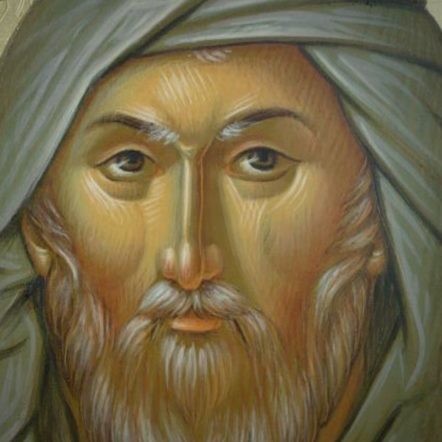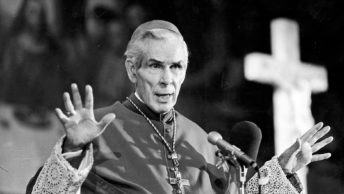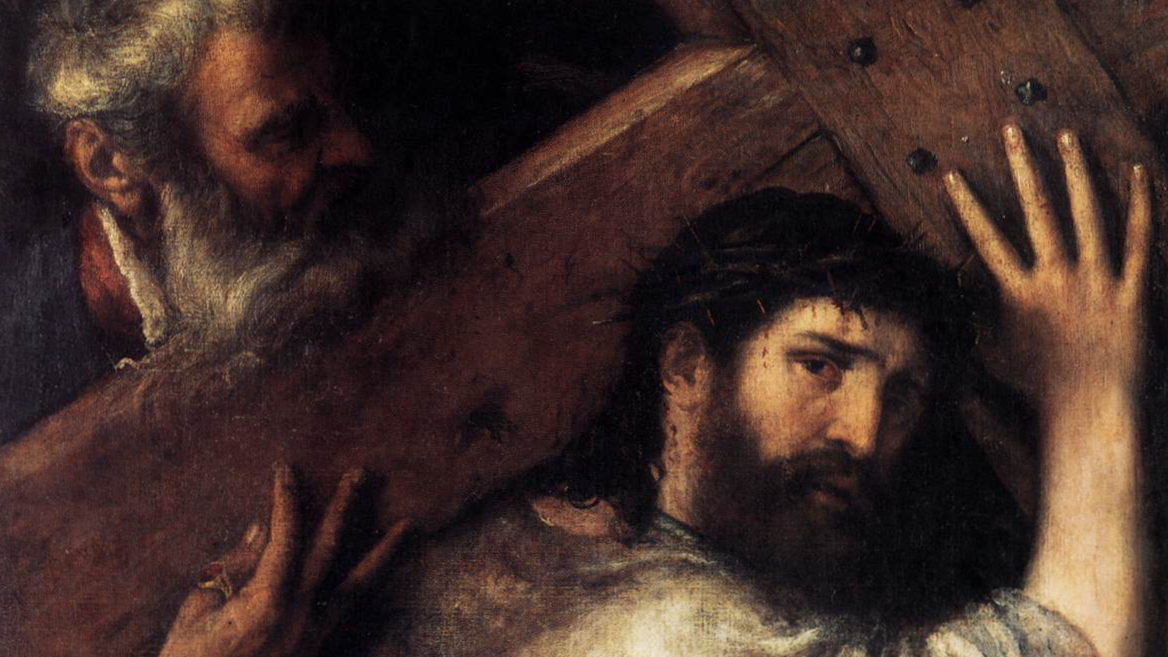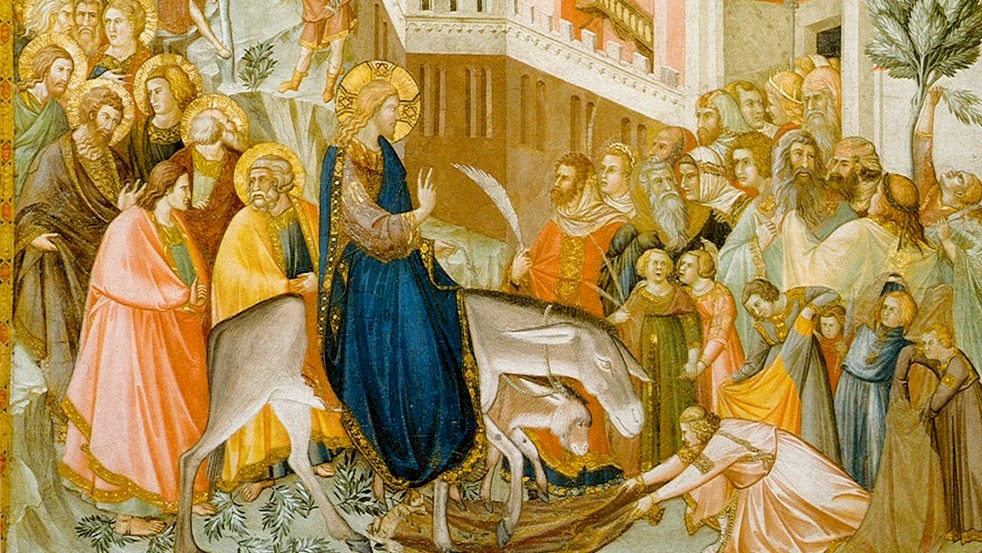In his general audience address of Wednesday 20 April 2011, Pope Benedict XVI described Holy week as the culmination of the Lenten journey. It would be appropriate if we could delve deeper into the apex of the Lenten iter, which is of course Holy Week, under the guidance of the Fathers of the Church.
The Holy Week kicks off with Jesus’ solemn entrance in Jerusalem. Thus, for St Ephrem the Syrian (306-373), Palm Sunday is a moment on which we are invited to reflect on Jesus’ journey to his own passion and death. However the Church is feasting because Christ is both her King as well as her Spouse. This Syrian Doctor of the Church writes: Yesterday, Christ raised Lazarus from the dead; today, He is going to His own death. Yesterday, He tore off the strips of cloth which bound Lazarus; today, He is stretching out His Hand, to those who want to bind Him. Yesterday, He tore that man away from darkness; today, for humankind, He is going down into darkness and the shadow of death. And the Church is celebrating. She is beginning the feast of Feasts, for she is receiving her King as a Spouse, for her King is in her midst.
From his end, St Romanus the Melodist (c 490-c 556) sees Palm Sunday as a Feast of salvation for those who are humble and who are waving the palms in the hope that their hearts are opened to Christ’s salvation. He says: Hosanna!”—which means: “Save! Hosanna to You Who are in the highest. O Almighty, save those who are humbled. Have mercy on us, in consideration of our palms, may the palms we wave move Your Heart, You who come to call Adam …
On Holy Thursday Christ showed us his total and infinite love by instituting the Eucharist and the ministers who make it. The great western Father and Doctor of the Church, St Augustine (354-430) sees the Eucharist as the meal of the perfection of love which helps us love one another in the highest sense of the word. Let us appreciate what he says in Treatise 84:
Dear brethren, the Lord has marked out for us the fullness of love that we ought to have for each other. He tells us – No-one has greater love than the man who lays down his life for his friends. In these words, the Lord tells us what the perfect love we should have for one another involves. John, the evangelist who recorded them, draws the conclusion in one of his letters – As Christ laid down His life for us, so we too ought to lay down our lives for our brothers. We should indeed love one another as He loved us, He who laid down His life for us.
This is surely what we read in the Proverbs of Solomon: If you sit down to eat at the table of a ruler, observe carefully what is set before you, then stretch out your hand, knowing that you must provide the same kind of meal yourself. What is this ruler’s table, if not the one at which we receive the body and blood of Him who laid down His life for us? What does it mean to sit at this table if not to approach it with humility? What does it mean to observe carefully what is set before you, if not to meditate devoutly on so great a gift? What does it mean to stretch out one’s hand, knowing that one must provide the same kind of meal oneself, if not what I have just said: as Christ laid down His life for us, so we in our turn, ought to lay down our lives, for our brothers? This is what the Apostle Paul said – Christ suffered for us, leaving us an example, that we might follow in his footsteps.
This is what is meant by providing “the same kind of meal.” This is what the blessed martyrs did, with such burning love. If we are to give true meaning, to our celebration of their memorials, to our approaching the Lord’s table, in the very banquet at which they were fed, we must, like them, provide “the same kind of meal.
At this table of the Lord we do not commemorate the martyrs in the same way as we commemorate others who rest in peace. We do not pray for the martyrs as we pray for those others, rather, they pray for us, that we may follow in His footsteps. They practiced the perfect love, of which the Lord said, there could be none greater. They provided “the same kind of meal” as they had themselves received at the Lord’s table.
This must not be understood as saying, that we can be the Lord’s equals by bearing witness to Him, to the extent of shedding our blood. He had the power of laying down His life, we by contrast, cannot choose the length of our lives and we die, even if it is against our will. He, by dying, destroyed death in Himself; we are freed from death only in His death. His body did not see corruption, our body will see corruption and only then be clothed through Him, in incorruption, at the end of the world. He needed no help from us in saving us, without Him, we can do nothing. He gave Himself to us, as the vine to the branches, apart from Him, we cannot have life.
Finally, even if brothers die for brothers, yet no martyr by shedding his blood brings forgiveness for the sins of his brothers, as Christ brought forgiveness to us. In this, He gave us, not an example to imitate but a reason for rejoicing. Inasmuch, then, as they shed their blood for their brothers, the martyrs provided “the same kind of meal” as they had received at the Lord’s table. Let us then love one another as Christ also loved us and gave Himself up for us.
On Good Friday we are led to reflect that Christ saved us by undergoing his passion and death. St Ephrem the Syrian reflects: As you contemplate the sticks that Isaac was laid upon, reflect on the cross. As you look on the fire, meditate on the love. Look too on the sheep hanged by its two horns on the plant that is called ‘Sabek’. Look too on Christ, the Lamb of God, hanged by his two hands upon a Cross. The plant called Sabek means ‘forgiveness’, for it saved from slaughter the old man’s child. It foreshadows the cross that forgives the world its sins and grants it life. The ram hanging on the Sabek plant mystically redeemed Isaac alone. While the Lamb of God hanging on the cross delivered the world from Death and Hell.
Furthermore, St John Chrysostom (347-407) gives us the insight that Christ loved us from the words he spoke on the cross. He says: But we are able to see Christ’s inexpressible love for man not only from the cross itself but also from the words which He spoke while upon the cross. At the very time when He was nailed and they were mocking Him, deriding Him and spitting upon Him, He said: “Father, forgive them for they do not know what they do” (Luke 23:34)… At the same time that they were saying, “If You are the Son of God save Yourself,” He was accomplishing everything necessary to save these same ones who were reproaching Him. …He did forgive them, if they wished to repent, because if He had not forgiven them this sin, Paul would not have become an apostle;’ if He had not forgiven them this sin, the three thousand and the five thousand, and the many other thousands, would not have immediately believed.
Finally, Holy Saturday is the day when we meditate on Christ’s love and salvation for those souls entrapped in the underworld. In fact, Christ slept, so that We might be awakened, He died, so that we might live. St Augustine beautifully expresses this life-giving insight when he says:
The Lord, although He was God, became man. He suffered for the sake of those who suffer, He was bound for those in bonds, condemned for the guilty, buried for those who lie in the grave but He rose from the dead and cried aloud: “Who will contend with Me? Let him confront Me.” I have freed the condemned, brought the dead back to life, raised men from their graves. Who has anything to say against Me?
I, He said, Am the Christ, I have destroyed death, triumphed over the enemy, trampled hell underfoot, bound the strong one and taken men up to the heights of Heaven. I Am the Christ. Come, then, all you nations of men, receive forgiveness for the sins that defile you. I Am your Forgiveness.
I Am the Passover which brings salvation. I Am the Lamb Who was immolated for you. I Am your Ransom, your Life, your Resurrection, your Light, I am your Salvation and your King. I will bring you to the heights of Heaven with My own Right Hand I will raise you up and I will show you the Eternal Father.
Moved by such love, tenderness and generosity of Christ let us put into practice what Pope Francis suggests us to do in order to prepare for this Holy Week: Holy Week is a good occasion to go to confession and to take up the right path again.
Lord, by the teachings, and most of all, the powerful intercession of St Augustine, St Ephrem the Syrian, St John Chrysostom and St Romanus the Melodist, open our hearts during this Holy Week to resort to the Sacrament of the Confessional so that we take up, once more, the path of holiness. Amen.







